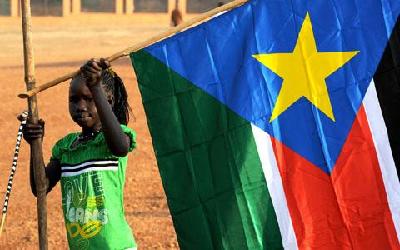
This is the VOA Special English Education Report.
On July 9th, South Sudan becomes the world's 193th nation. Almost 99 percent of voters last month chose independence from the north.
South Sudan will also be one of the world's least developed nations. This follows years of war and neglect by the Sudanese government in Khartoum.
South Sudan is about the size of France. Yet it has only 50 kilometers of good roads and almost no public electrical power or other basic systems.
Illiteracy rates are high. There are estimates that more than 80 percent of the population cannot read or write.
There are five universities. Three of them moved their operations to the north during the war. The southern government has brought most of the students back.
Officials estimate that about 25,000 students have registered at the five universities. Classes were supposed to start in April. But the Ministry for Higher Education in the south has now moved the opening date to the middle of May.
The government pays for food and provides housing for students. But higher education minister Joseph Ukel says finding enough space was one reason for the delay.
Another issue is money. The government in Khartoum will pay for the schools until July. Mr. Ukel says the southern government's proposed budget for this year does not include any money for the universities.
Then there is the problem of teachers. Almost 75 percent of the lecturers are from the north. They are not likely to travel to the south to continue teaching for their schools.
Mr. Ukel says his ministry has asked southern Sudanese teachers outside the country to return.
JOSEPH UKEL: "Their problem was, what do you give us by way of carry-away salaries? That became our problem."
William Deng heads a commission supervising the return of 90,000 former fighters to civilian life. He says most of the soldiers who have come out of the southern army need education and training.
WILLIAM DENG: "The skill they only know is soldiering. Now, you must train them with life skills, such as carpentry, making bricks and also small agriculture, or micro-financing."
Only four percent of good land in South Sudan is being farmed. Millions of people need food aid to survive. The head of Juba University, Aggrey Abate, says his school can play a big part in training agricultural specialists.
AGGREY ABATE: "Agriculture is a very important area. And we, as an institution, will have the role of producing those who will come out and work in the agricultural sector, in terms of the necessary interventions that need to be made to improve our food security."
And that's the VOA Special English Education Report. I'm Bob Doughty.
Sudan's Bashir not to stand in next election: party official
US confident of successful referendum vote in southern Sudan
Jimmy Carter tackles guinea worm in Sudan
Washington offers Sudan a faster way off its terror list
(来源:VOA 编辑:崔旭燕)
